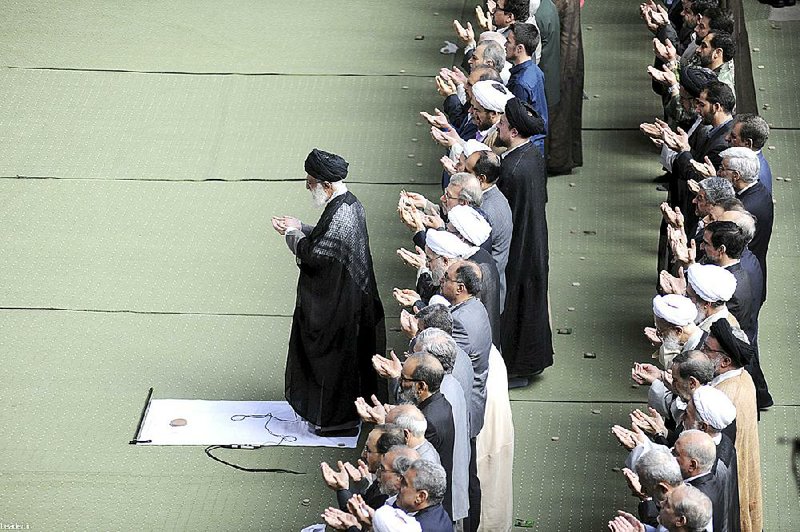TEHRAN, Iran -- Ayatollah Ali Khamenei, the supreme leader of Iran, voiced support Saturday for those who negotiated his country's nuclear deal with world powers while emphasizing that his country's policy toward the "arrogant" U.S. won't change.
RELATED ARTICLES
http://www.arkansas…">Iran sanctions set to fall, Asia, Europe keen to tradehttp://www.arkansas…">Lifting sanctions would restart Iran oil exports, cut prices more
Khamenei said a more wide-ranging agreement with America is unlikely, taking a different stance than moderate President Hassan Rouhani, who has said the Vienna accord could "step-by-step remove bricks from the wall of mistrust" between Iran and the U.S.
The ayatollah also praised the Iranian negotiators who struck the deal, signaling support as Iran's Parliament and its Supreme National Security Council -- the nation's highest security decision-making body -- consider the agreement in the coming days.
"Our policy toward the arrogant U.S. government won't change at all," Khamenei said in an address carried live by state television. "We have no negotiations with America about various global and regional issues. We have no negotiations on bilateral issues.
"Their actions in the region are 180 degrees different from ours."
Speaking after a special prayer marking the end of the Muslim fasting month of Ramadan, Khamenei portrayed the nuclear agreement as a victory for Iran because it does not require the country to completely stop enriching uranium, as some in the West had wanted.
"After 12 years of struggling with the Islamic republic, the result is that they have to bear the turning of thousands of centrifuges in the country," said Khamenei, referring to the United States and its five negotiating partners.
He also stressed that Iran will continue to support its allies in the Middle East, including the Lebanese Hezbollah, Palestinian resistance groups and the Syrian government.
Iran calls its Lebanese ally Hezbollah a "resistance movement," while the U.S. classifies it as a terrorist group. Iran also continues to call for the destruction of Israel, which Khamenei described in his speech as a "terrorist, baby-killer government."
Israeli Prime Minister Benjamin Netanyahu has strongly opposed the nuclear deal.
The West has feared Iran's nuclear program could allow it to build atomic weapons. Iran says its program is for peaceful purposes. The deal is intended to significantly limit Tehran's ability to produce nuclear weapons for more than a decade in return for lifting international sanctions.
Iranian analyst Davoud Hermidas Bavand said Khamenei's remarks were primarily for domestic consumption as a "detente in Iran-U.S. relations is an inevitable consequence of the nuclear deal."
"Khamenei sought to pacify hard-liners who are worried about rapprochement with Washington," said Bavand, a former diplomat and a professor of international law at Science and Research University in Tehran. "The deal has increased Rouhani's popularity, and Khamenei wants to create a balance and boost the morale of disappointed hard-liners."
Bavand said Iran and the U.S. share common interests in Afghanistan and Iraq, including over the ongoing fight against the militant Islamic State group. He also said Khamenei's carefully worded speech likely contains a warning to Rouhani to slow down the pace of detente with Washington.
Conservative politician Hamid Reza Taraqi said Khamenei sought to "nullify efforts by the U.S. to damage Iran's anti-arrogance stance."
"Americans have tried to suggest that Iran has given up its anti-U.S. stance in order to tarnish Tehran's image in the eyes of its supporters. The leader's remarks nullified that," he said.
Taraqi accused Rouhani and his moderate allies of "seeking to pave the way for normalization of relations with the U.S."
Although analysts said Khamenei's positive portrayal of the agreement probably would quiet hard-line critics in Iran, it also seemed likely to become fodder for critics in the United States, complicating President Barack Obama's efforts to sell the deal to Congress and the American people.
"I think we all understand the caliber of people we are dealing with, and it adds to the bipartisan skepticism regarding the agreement," Sen. Bob Corker, R-Tenn. and chairman of the Senate Foreign Relations Committee, said Saturday.
The agreement, which in its final form runs to 159 pages, was reached Tuesday after 20 months of negotiations.
Obama has made the agreement a benchmark of his presidency. It is opposed by Republicans as well as Israel and Saudi Arabia, two of the United States' most significant allies in the region. They have denounced it as a diplomatic mistake that will strengthen the economic and military power of a nation that threatens its neighbors, engages in and supports hostage-taking and terrorism, and is bent on acquiring nuclear weapons.
Obama has insisted the agreement is "not built on trust -- it is built on verification." Khamenei portrayed it as an acceptance by the West of Iran's commitment to go ahead with its nuclear program.
Khamenei's speech stopped short of a flat-out endorsement of the agreement. But he did not include any specific criticism of the deal or its terms.
Iranian hard-liners have complained that it will reduce the nuclear program to just a symbol, not an industrial effort. Many hard-liners also fear that it will end Iran's enmity toward America.
Khamenei nodded to the complaints, accusing the West of trying to "remove all of the nuts and bolts of Iran's nuclear industry."
U.S. support for Israel will remain a roadblock to relations, he signaled. Noting Washington regards Hezbollah as a terrorist organization, Khamenei asked how "Americans can support the child-killing Zionist government and call Hezbollah terrorist? How can one interact, negotiate or come to an agreement with such a policy?"
Worshippers began chanting and pumping their fists when he said the slogans "Death to Israel" and "Death to America" would continue to be heard in the streets of Iran.
Information for this article was contributed by Ali Akbar Dareini of The Associated Press and Thomas Erdbrink of The New York Times.
A Section on 07/19/2015
